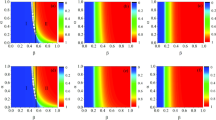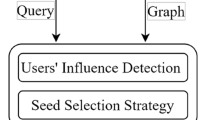Abstract
Data dissemination is a challenging issue in mobile social networks. It aims at increasing the overall delivery ratio and reducing the overall delivery delay. Most of the existing works assume all the users in a network are cooperative, i.e., the users are willing to carry the messages that they are not interested in while the nodes they meet maybe. In reality, the behaviors of each individual are naturally selfish, especially when the resources they have and they can access are limited. A data dissemination protocol cannot be pragmatic unless the selfishness is considered. This work proposes an incentive scheme to stimulate the users in a network to be more cooperative. Credits are the stimulus to encourage users to be more cooperative for data dissemination. We evaluate each node’s ability to fetch messages of a specific kind of interest and every single user can rent other nodes to help with obtaining the interested messages by paying credits. Extensive simulations on real traces are carried out to evaluate the proposed incentive scheme.









Similar content being viewed by others
References
Liu G, Ji S, Wu J, Cai Z (2013) Credit-based incentive data dissemination in mobile social networks, IIKI
Kayastha N, Niyato D, Wang P, Hossain E (2011) Applications, architectures, and protocol design issues for mobile social networks: a survey. Proc IEEE 99(12):2130–2158
Ma L, Teymorian AY, Cheng X (2008) A hybrid rogue access point protection framework for commodity Wi-Fi networks, INFOCOM, pp 1220–1228
Ji S, Beyah R, Cai Z (2013) Minimum-latency broadcast scheduling for cognitive radio networks SECON, pp 389–397
Cheng S, Li J, Cai Z (2013) O(\(\epsilon\))-approximation to physical world by sensor networks, INFOCOM, pp 3084–3092
Li J, Cheng S, Gao H, Cai Z (2014) Approximate physical world reconstruction algorithms in sensor networks. IEEE Trans Parallel Distrib Syst. doi:10.1109/TPDS.2013.2297121
Ai C, Guo L, Cai Z, Li Y (2009) Processing area queries in wireless sensor networks. Mobile Ad-hoc Sens Netw, pp 1–8
Sun Y, Bie R, Yu X, Wang S (2013) Semantic link networks: theory, applications, and future trends. J Internet Technol 13(3):365–378
Cai Z, Lin G, Xue G (2005) Improved approximation algorithms for the capacitated multicast routing problem, COCOON, pp 136–145
Burgess J, Levine BN, Mahajan R, Zahorjan J, Balasubramanian A, Venkataramani A, Zhou Y, Croft B, Banerjee N, Corner M, Towsley D (2008) CRAWDAD data set umass/diesel (v. 2008-09-14). Downloaded from http://crawdad.cs.dartmouth.edu/umass/diesel
Marti S, Giuli T, Lai K, Baker M (2000) Mitigating routing misbehavior in mobile ad hoc networks. In: MobiCom ‘00: proceedings of the 6th annual international conference on mobile computing and networking. ACM, New York, NY, USA
Buchegger S, Boudec J-YL (2002) Performance analysis of the CONFIDANT protocol: cooperation of nodes fairness in dynamic ad-hoc NeTworks. In: MobiHoc 02: proceedings of IEEE/ACM symposium on mobile ad hoc networking and computing
Michiardi P, Molva R (2002) Core: a collaborative reputation mechanism to enforce node cooperation in mobile ad hoc networks. In: Proceedings of the IFIP TC6/TC11 sixth joint working conference on communications and multimedia security. Kluwer, B.V
He Q, Wu D, Khosla P (2004) SORI: a secure and objective reputationbased incentive scheme for ad hoc networks. In: Proceedings of the WCNC, Atlanta, GA, pp 825–830
Balakrishnan K, Deng J, Varshney V (2005) Twoack: preventing selfishness in mobile ad hoc networks. In: Wireless communications network conference, 2005 IEEE, vol 4
Zhang Y, Fang Y (2007) A fine-grained reputation system for reliable service selection in peer-to-peer networks. IEEE Trans Parallel Distrib Syst 18(8):1134–1145
Shevade U, Song H, Qiu L, Zhang Y (2008) Incentive-aware routing in DTNs. In: Proceedings of the ICNP, pp 238–247
Buttyan L, Dora L, Felegyhazi M, Vajda I (2010) Barter trade improves message delivery in opportunistic networks. Ad Hoc Netw 8(1):1–14
Mei A, Stefa J (2010) Give2Get: forwarding in social mobile wireless networks of selfish individuals. In: Proceedings of ICDCS, pp 488–497
Buttyan L, Hubaux JP (2000) Enforcing service availability in mobile ad-hoc WANs. In: Proceedings of MoBiHoc, pp 87–96
Zhong S, Chen J, Yang YR (2003) Sprite, a simple, cheat-proof, credit-based system for mobile ad-hoc networks. In: Proceedings of INFOCOM, pp 1987–1997
Salem NB, Buttyan L, Hubaux JP, Jakobsson M (2003) A charging and rewarding scheme for packet forwarding in multi-hop cellular networks. In: Proceedings of MoBiHoc, pp 13–24
Jakobsson M, Hubaux JP, Buttyan L (2003) A micropayment scheme encouraging collaboration in multi-hop cellular networks. In: Proceedings of financial cryptography, pp 15–33
Chen B, Chan MC (2010) MobiCent: a credit-based incentive system for disruption tolerant network. In: Proceedings of INFOCOM, pp 1–9
Ning T, Yang Z, Xie X, Wu H (2011) Incentive-aware data dissemination in delay-tolerant mobile networks, SECON
Wang S, Liu M, Cheng X, Li Z, Huang J, Chen B (2013) Opportunistic routing in intermittently connected mobile P2P networks. IEEE J Sel Areas Commun (JSAC)
Pietilainen A-K, Diot C, (2012) CRAWDAD data set thlab/sigcomm2009 (v. 2012-07-15), Downloaded from http://crawdad.cs.dartmouth.edu/thlab/sigcomm2009
Hui P, Chaintreau A, Scott J, Gass R, Crowcroft J, Diot C (2005) Pocket switched networks and human mobility in conference environments. In: ACM SIGCOMM workshop on delay-tolerant networking (WDTN)
Gao W, Li Q, Zhao B, Cao G (2009) Multicasting in delay tolerant networks: a social network perspective. In: ACM MobiHoc
Srinivasan V, Motani M, Ooi WT (2006) Analysis and implications of student contact patterns derived from campus schedules. In: ACM SIGCOMM workshop on delay-tolerant networking, proceedings of the 12th annual international conference on mobile computing and networking, pp 86–97 (Mobicom06)
Acknowledgments
This work is partly supported by the National Science Foundation (NSF) under Grants Nos. CNS-1152001 and CNS-1252292 and National Natural Science of China under Grant Nos. 61373083 and 61173094.
Author information
Authors and Affiliations
Corresponding author
Additional information
The short version of this manuscript is in IIKI 2013 [1].
Rights and permissions
About this article
Cite this article
Liu, G., Ji, S. & Cai, Z. Strengthen nodal cooperation for data dissemination in mobile social networks. Pers Ubiquit Comput 18, 1797–1811 (2014). https://doi.org/10.1007/s00779-014-0791-2
Received:
Accepted:
Published:
Issue Date:
DOI: https://doi.org/10.1007/s00779-014-0791-2




